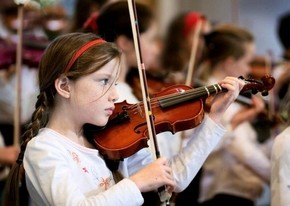Everyone knows that music education benefits every child who is lucky enough to have access to lessons and instruments. It helps children improve their math and critical thinking skills, and it expands their overall horizons. However, music classes are among the first to be cut when school budgets get tight. Here are some ways that music educators can show just how essential their classes are.
Integrate History
Children and teenagers do not always appreciate classical music. They would grow to understand its value, importance and relevance to modern popular music if they were given light reading assignments or shown educational films during class periods. The only surviving music from these eras was commissioned for the church, which is why it was written down and preserved.
Music educators and educational institutions need to stop assuming that all of their students are coming to the table with knowledge of Christianity, particularly the history of the church. Explain what masses are before assigning them to school choirs.
Teach Theory
Music theory is fascinating. Once children overcome the subject’s initial similarities to basic math, they will enjoy the problem-solving aspect of analyzing chord progressions. Students who understand how music theory works on paper have a more thorough understanding of how to improvise while playing their instruments.
Along with a little light history, lessons in theory will help provide a measurable rubric by which a teacher can show how much his or her students are improving. Some music education programs including a master’s in music education are starting to emphasize the need to give written exams to students for this very reason.
Get Creative with Song Choices
There is no need to keep presenting the holiday concerts with the standard Christmas songs or spring recitals with the same rotations of classical pieces. It is easy to find orchestral and choral arrangements of popular songs. There are whole suites of instrumental music based on Beatles and classic jazz albums. Similarly, there are enough contemporary Christmas pop songs to make for a holiday concert that will make children excited to perform.
Be Sensitive to the Needs of Students
Not all musicians are born performers. Some students regard playing music as if it were like reading a book; they think of it as something relaxing and enriching they do by themselves. Lots of shy children feel driven out of music by education’s emphasis on recitals and the manner in which solos are presented as the ultimate reward for talent and hard work. There is great value in being a solid, dependable ensemble player, and these students should be acknowledged as well.
By following these tips and working to truly enrich the lives of their students through music, educators can work toward proving how vital music classes are.

